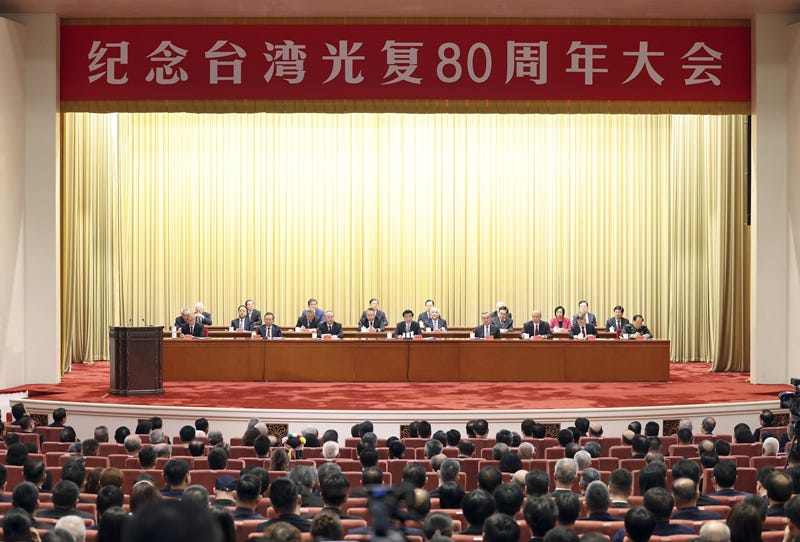Following the grand gathering marking the 80th anniversary of Taiwan’s restoration to China on Saturday, Xinhua News Agency released three consecutive commentaries on Taiwan over the next three days, all under the byline “Zhongtaiwen” (钟台文).
The commentaries are titled:“The Origin and Nature of the Taiwan Question” (台湾问题的由来和性质), “The Development of Cross-Strait Relations and the Benefits of Reunification” (两岸关系发展和统一利好), and “National Reunification Is Inevitable and Unstoppable” (祖国必然统一势不可挡)
Some seasoned overseas China-watchers noted that, based on naming conventions commonly used in the articles published by China’s central news organizations, “Zhongtaiwen” is almost certainly a collective pen name rather than an individual author. The name likely indicates commentary associated with agencies or institutions responsible for Taiwan-related affairs.
Xinhua later published an English-language piece on Tuesday summarizing these three commentaries, and said “Xinhua News Agency was entrusted to publish” them—but without explaining the meaning of “Zhongtaiwen.”
During those three days, some overseas China-watchers and several friends asked me the same question:
What is the purpose of these articles, especially when they clearly emphasize the theme of “reunification”?
From my reading, four points stand out:
1. The articles are consistent with the message conveyed at Saturday’s gathering.
At the commemorative meeting, China’s top political advisor Wang Huning said that after peaceful reunification, with the support of a strong motherland, Taiwan will enjoy better economic development, stronger energy and resource security, improved infrastructure, enhanced security, broader external exchanges, better livelihoods for its people, and a more vibrant cultural and spiritual life. 和平统一之后,有强大祖国做后盾,台湾经济发展会更好、能源资源保障会更好、基础设施建设会更好、安全保障会更好、对外交往会更好,台湾同胞民生福祉会更好、精神文化生活会更好。
Addressing about 500 attendees, Wang, chairman of the Chinese People’s Political Consultative Conference National Committee, called on people on both sides of the Taiwan Strait to work together to advance national reunification, and to leave no room for “Taiwan independence” separatist activities in any form.
2. The emphasis on reunification is not entirely new — it reflects themes already present in recent top-level documents.
“Promoting national reunification” is already written into the report to the 20th CPC National Congress in 2022, as a guiding policy direction. In the full text of the newly released Recommendations of the Central Committee of the Communist Party of China for Formulating the 15th Five-Year Plan for National Economic and Social Development, the Taiwan-related section once again highlights 推进祖国统一大业 (“advancing the cause of national reunification”).
Seen through this lens, the purpose of the commentaries is consistent and expected:
to explain the historical and political logic of the Taiwan question
to outline the governance framework envisioned after reunification,
and to convey Beijing’s confidence and determination that reunification is inevitable.
3. The commentaries offer clues about what Beijing envisions after reunification
Below are several excerpts I found noteworthy, with my interpretation.
我们追求的国家统一,不仅是形式上的统一,更重要的是两岸同胞的心灵契合。
Our goal is not only an institutional reunification but also unity between hearts of people across the Strait.
(from Article 2: The Development of Cross-Strait Relations and the Benefits of Reunification” )
This suggests Beijing is emphasizing emotional and social integration, not just administrative control. Implicitly, reunification without mutual trust could lead to new tensions.
两岸在文化教育、医疗卫生、社会保障等民生领域可以实现资源同享,长期困扰台湾同胞的民生难题,可以得到根本性解决。
Resources in education, healthcare and social security can be shared across the Strait after reunification, thereby addressing long-standing livelihood challenges.
(from Article 2: The Development of Cross-Strait Relations and the Benefits of Reunification” )
This indicates that Beijing believes it understands Taiwan’s socioeconomic issues and is positioning reunification as a solution provider. Understanding must come before solving.
…… 私人财产、宗教信仰、合法权益将得到充分保障,爱台爱乡的感情将得到充分照顾。
…… Personal property, religious beliefs and the legal rights and interests of local people will be fully protected in Taiwan, while their connections to the island’s traditions and heritage will be valued.
(from Article 2: The Development of Cross-Strait Relations and the Benefits of Reunification” )
Religions widely practiced in Taiwan—Chinese folk religion or traditional religion (folk Taoism + ancestral worship), Buddhism, Taoism, and related Chinese cultural beliefs—already align with mainland traditions, so Beijing does not appear to view religion as a major post-reunification challenge.
经中国中央政府批准,外国可以在台湾设立领事机构或其他官方、半官方机构,国际组织和机构可以在台湾设立办事机构,有关国际公约可以在台湾适用,有关国际会议可以在台湾举办。
(After reunification) With approval from the central government, foreign countries could set up consulates and other official or semi-official institutions in Taiwan, and international organizations will have offices in Taiwan. In addition, international agreements could be applied in Taiwan and international events held there.
(from Article 2: The Development of Cross-Strait Relations and the Benefits of Reunification” )
This suggests that a post-reunification Taiwan could, in theory, host major international events — for example, APEC or Shanghai Cooperation Organization summits.
4. The articles underline that Beijing sees reunification as inevitable
统一不是一种选择,而是一种必然。
Reunification is not a matter of choice, but an inevitability.
...... 决定两岸关系走向的关键因素是祖国大陆的发展进步。...... 中华民族一定是强必统,统更强。从两岸实力对比和国际格局演变趋势看,只会对支持统一的正义一方越来越有利。
The key factor determining the direction of cross-Strait relations is the development and progress of the mainland. ...... A strong nation must be unified; reunification will further strengthen the nation. Given the shifting cross-Strait balance of strength and global dynamics, situation will only become increasingly favorable for the just cause of supporting reunification.
(from Article 3: “National Reunification Is Inevitable and Unstoppable” )
While some observers argue that “time is not on Beijing’s side,” the commentaries express the opposite view: the stronger China becomes (economically, technologically, socially), the more favorable the environment for reunification. In other words, China’s attractiveness and influence—including innovation, lifestyle and development—are viewed as important drivers, not just hard power.
Final thought
These commentaries reveal not only Beijing’s messaging about why reunification will happen, but also how it imagines governing Taiwan afterward. Regardless of one’s position, they offer rare insight into Beijing’s internal framing of the issue.






Great that China is outlining what reunification means in practice. To me, it looks promising!